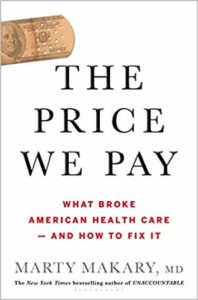Health care has been a big topic on EconTalk this year, and this episode continues our exploration. This week, host Russ Roberts welcomed physician Marty Makary to talk about his book, The Price We Pay, in which he describes a wretched system of price gouging, shadow pricing, and predatory pricing and collections practices in the US health care system. How can this happen? Is it because demand for health care is inelastic? Is it a natural consequence of the “medicalization of everyday life” we’ve been experiencing over the last several decades?
Makary says, “And we all know it’s happening, right? It’s a combination of bad judgment, cutting corners, corporate medicine, a consumerist culture where people come in now demanding things.” So who’s to blame, and how can we fix it? Have you had any experiences in your own life than can help us shed light on this problem? What about “Medicare for All”- can that be the solution? None of us want people in need of care to go without… right???

Let’s hear what you think. Use the prompts below to help you continue to think about the issues raised in this week’s episode. Or use them to start your conversation offline. Either way, we hope you’ll help us continue this conversation.
1- What’s the biggest factor in the escalating cost of health care, according to Makary? Why does Makary feel so strongly that we should be talking about medical prices as opposed to health care costs? What does he mean when he says, “proxy shoppers are driving the market in healthcare”?
2- Roberts points out that we have had areas with transparent pricing, such as Lasik, IVF, and cosmetic procedures; Makary agrees noting a global reduction in pricing over last three decades. Why are these specialties different? What about veterinary care, which seems to buck the trend of decreasing costs and transparent pricing?
3- Roberts and Makary discuss the recent Executive Order on price and quality transparency. (Had you ever heard of this before this week’s episode? I admit I had not.) What do you see as the pros and cons of this Executive Order? What do you think its effect(s) will likely be?
4- Economists have always pointed to competition as a driving force in keeping prices low. Makary says there is competition among hospitals now, but it comes in the form of NFL games and valet parking. What what we need, he argues, is competition based on price and quality. Roberts asks, “But why don’t we have this now?” How does Makary respond? To what extent are you convinced? What other explanation(s) can you offer for this apparent lack of competition?
5- Why is Makary optimistic about the healthcare despite its current state? How does he believe that creating public accountability can change the way our health care is administered, and what is he doing to effect such a change?


Comments are closed.